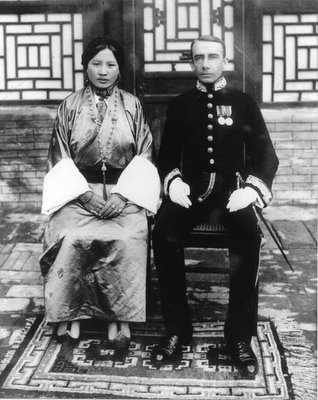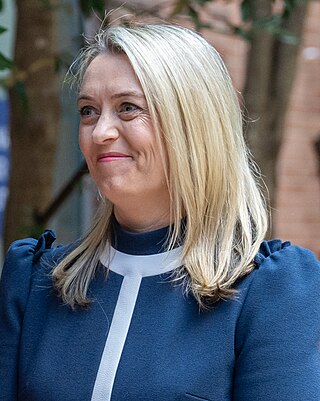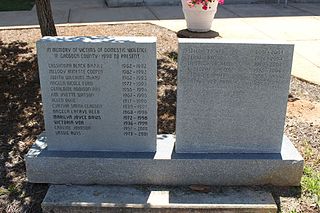
Marriage, also called matrimony or wedlock, is a culturally and often legally recognized union between people called spouses. It establishes rights and obligations between them, as well as between them and their children, and between them and their in-laws. It is nearly a cultural universal, but the definition of marriage varies between cultures and religions, and over time. Marriage becomes a social construct to adjudicate the conflicts of interest between consenting individuals and a transactional means to fulfill their needs. Typically, it is an institution in which interpersonal relationships, usually sexual, are acknowledged or sanctioned. In some cultures, marriage is recommended or considered to be compulsory before pursuing sexual activity. A marriage ceremony is called a wedding, while a private marriage is sometimes called an elopement.

A spouse is a significant other in a marriage or without marriage. In certain contexts, it can also apply to a civil union or common-law marriage. Although a spouse is a form of significant other, the latter term also includes non-marital partners who play a social role similar to that of a spouse, but do not have rights and duties reserved by law to a spouse. A male spouse is called a husband while a female spouse is called a wife.
Legal separation is a legal process by which a married couple may formalize a de facto separation while remaining legally married. A legal separation is granted in the form of a court order. In cases where children are involved, a court order of legal separation often makes child custody arrangements, specifying sole custody or shared parenting, as well as child support. Some couples obtain a legal separation as an alternative to a divorce, based on moral or religious objections to divorce.

A wife is a woman in a marital relationship. A woman who has separated from her partner continues to be a wife until their marriage is legally dissolved with a divorce judgment. On the death of her partner, a wife is referred to as a widow. The rights and obligations of a wife to her partner and her status in the community and law vary between cultures and have varied over time.
Common-law marriage, also known as non-ceremonial marriage, sui iuris marriage, informal marriage, de facto marriage, or marriage by habit and repute, is a legal marriage despite non-compliance with the requirements for a statutory marriage, at least in the jurisdictions where marriage can still be contracted this way.

First lady or first gentleman is an unofficial title usually used for the spouse, and occasionally used for the offspring or other relative, of a non-monarchical head of state or chief executive. The term is also used to describe a person seen to be at the top of her profession or art.
Marital rape or spousal rape is the act of sexual intercourse with one's spouse without the spouse's consent. The lack of consent is the essential element and need not involve physical violence. Marital rape is considered a form of domestic violence and sexual abuse. Although, historically, sexual intercourse within marriage was regarded as a right of spouses, engaging in the act without the spouse's consent is now widely classified as rape by many societies around the world, and increasingly criminalized. However it is repudiated by some more conservative cultures.
Uxoricide is the killing of one's own wife. It can refer to the act itself or the person who carries it out. It can also be used in the context of the killing of one's own girlfriend. The killing of a husband or boyfriend is called mariticide.
In the common law, spousal privilege is a term used in the law of evidence to describe two separate privileges that apply to spouses: the spousal communications privilege and the spousal testimonial privilege.

The spouse of the prime minister of Australia is generally a high-profile individual who assists the Australian prime minister with ceremonial duties as well as performing various other functions. The position is known as the partner of the prime minister of Australia when the prime minister is unmarried but is in a relationship.

This article summarizes the same-sex marriage laws of states in the United States. Via the case Obergefell v. Hodges on June 26, 2015, the Supreme Court of the United States legalized same-sex marriage in a decision that applies nationwide, with the exception of American Samoa and sovereign tribal nations.

Domestic violence is violence or other abuse that occurs in a domestic setting, such as in a marriage or cohabitation. Domestic violence is often used as a synonym for intimate partner violence, which is committed by one of the people in an intimate relationship against the other person, and can take place in relationships or between former spouses or partners. In its broadest sense, domestic violence also involves violence against children, parents, or the elderly. It can assume multiple forms, including physical, verbal, emotional, economic, religious, reproductive, financial abuse, or sexual abuse. It can range from subtle, coercive forms to marital rape and other violent physical abuse, such as choking, beating, female genital mutilation, and acid throwing that may result in disfigurement or death, and includes the use of technology to harass, control, monitor, stalk or hack. Domestic murder includes stoning, bride burning, honor killing, and dowry death, which sometimes involves non-cohabitating family members. In 2015, the United Kingdom's Home Office widened the definition of domestic violence to include coercive control.
Partner effects refer to the ways in which a spouse or consensual mate influences the life of their significant other. More specifically, the effect a partner has on another's career and overall occupational status. In the past, less research had been done to observe the effects of spousal education and status position on one another because it had been assumed that the wife would adopt the husband's status. Over the past few decades, however, opportunity for women in the workplace has increased dramatically giving them a larger role in overall family income and status. Women's expanded role has brought about many changes in the opportunities for families.

Domestic violence in United States is a form of violence that occurs within a domestic relationship. Although domestic violence often occurs between partners in the context of an intimate relationship, it may also describe other household violence, such as violence against a child, by a child against a parent or violence between siblings in the same household. It is recognized as an important social problem by governmental and non-governmental agencies, and various Violence Against Women Acts have been passed by the US Congress in an attempt to stem this tide.
The following outline is provided as an overview of and topical guide to domestic violence:

Fionnuala Bríd Kenny is an Irish public relations specialist who is the wife of former Taoiseach Enda Kenny. She is a former press officer for the Fianna Fáil Party.
Domestic violence against men is violence or other physical abuse towards men in a domestic setting, such as in marriage or cohabitation. As with domestic violence against women, violence against men may constitute a crime, but laws vary between jurisdictions. Intimate partner violence (IPV) against men is generally less recognized by society than intimate partner violence against women, which can act as a further block to men reporting their situation.
Domestic violence is prominent in Nigeria as in other parts of Africa. There is a deep cultural belief in Nigeria that it is socially acceptable to hit a woman as a disciplinary measure. Cases of Domestic violence are on the high and show no signs of reduction in Nigeria, regardless of age, tribe, religion, or even social status. The CLEEN Foundation reports 1 in every 3 respondents admitting to being a victim of domestic violence. The survey also found a nationwide increase in domestic violence in the past 3 years from 21% in 2011 to 30% in 2013. A CLEEN Foundation's 2012 National Crime and Safety Survey demonstrated that 31% of the national sample confessed to being victims of domestic violence.
The spouse of the prime minister of New Zealand is the wife or husband of the New Zealand prime minister. The position is known as the partner of the prime minister of New Zealand when the prime minister is unmarried but is in a relationship. They are the hostess or host of Premier House. It is not an official office and, as such, they are not given a salary or official duties. When Henry Sewell became the country's first premier in 1856, his wife, Elizabeth Kittoe, became the first spouse to fill the role. The first husband to the prime minister was Burton Shipley, Jenny Shipley's husband, in 1997. The 23rd prime minister, Michael Joseph Savage, was a bachelor during his term, and prime minister Jacinda Ardern was never married to her partner Clarke Gayford during her tenure from 2017 to 2023. 41st prime minister, Chris Hipkins, is married, but has been separated from his wife, Jade Marie Hipkins, since 2022.








